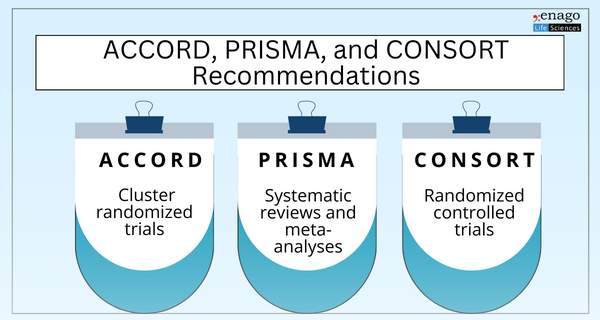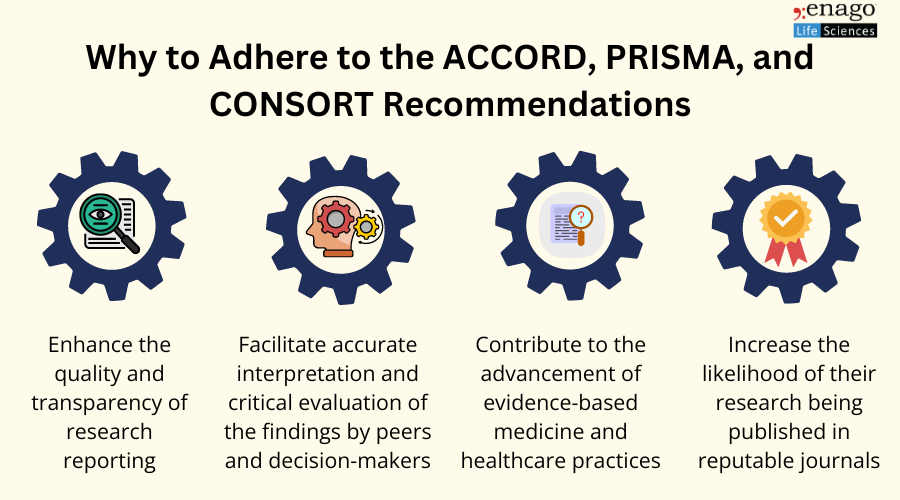Transparency is the guiding thread that leads both researchers and readers out of the ambiguity maze. Yet, too often, critical details get lost while data is transferred from a lab to published paper. This leaves readers grappling with incomplete information and researchers struggling to replicate or build upon previous work. This is where reporting guidelines such as ACCORD, PRISMA, and CONSORT come into the picture.
The need for meticulous reporting guidelines has become increasingly evident as the volume of research continues to grow exponentially. These guidelines not only serve as signposts for researchers, guiding them in the comprehensive documentation of their methods and results, but also act as a shield against the subtle erosion of research integrity.
Importance of Standardized Reporting
Incomplete reporting can have several implications. For example, in healthcare, a treatment that appears effective in a published study may fail to replicate in real-world scenarios if key details, such as patient demographics or intervention protocols, are ignored. Therefore, lack of transparency not only hampers scientific progress but also have real-world consequences, affecting patient care, public policy, and the allocation of resources.
The importance of standardized reporting cannot be overstated. It is the cornerstone upon which the scientific community builds trust, credibility, and advancement.
ACCORD, PRISMA, and CONSORT Recommendations
ACCORD, PRISMA, and CONSORT represent three pillars of this foundation, each tailored to specific types of research.

By understanding the unique contributions of ACCORD, PRISMA, and CONSORT, researchers can wield these tools not just as requirements to check off but as instruments to elevate the quality and impact of their work.
Comparing ACCORD, PRISMA, and CONSORT Guidelines
Here is a breakdown of comparison of guidelines to understand their scope and purpose.
| ACCORD | PRISMA | CONSORT | |
| Full Form | ACcurate COnsensus Reporting Document | Preferred Reporting Items for Systematic Reviews and Meta-Analyses | Consolidated Standards of Reporting Trials |
| Purpose | 1. Improve the completeness and transparency of reporting for studies using consensus methods
2. Enable readers to understand the consensus methods used to develop recommendations 3. Enhance trust in the recommendations made by consensus panels 4. Guide journal editors and peer reviewers in assessing manuscripts reporting consensus methods |
1. Improve the transparency and quality of reporting in systemic reviews and meta-analyses
2. Enhance reliability and usefulness of these studies through a clear reporting structure 3. Aid readers in understanding the review process and the reliability of the conclusions |
1. Improve the quality of reporting in Randomized controlled trials (RCTs)
2. Enable readers to assess the validity and reliability of the trial results through transparent reporting 3. Aid in the assessment of the study’s methodological rigor and the result interpretation |
| Scope | All consensus-based studies in biomedical/health-related research, regardless of the specific consensus method used (e.g. Delphi, nominal group technique, consensus meetings, etc.) | Systematic reviews and meta-analyses across various disciplines | Randomized controlled trials (RCTs) |
| Application | Authors writing up consensus studies for publication | Authors reporting systematic reviews and meta-analyses and peer reviewers and editors for critical appraisal of published systematic reviews | Researchers conducting randomized controlled trials
|
Understanding and adhering to these recommendations are important for researchers due to the following reasons:

While ACCORD, PRISMA, and CONSORT serve different purposes and target distinct types of studies, they share the common goal of improving the quality and transparency of research reporting. Researchers should be aware of these guidelines and select the one most relevant to their study type to ensure comprehensive and transparent reporting, ultimately contributing to the integrity and reproducibility of scientific research.
Author:

Anagha Nair
Editorial Assistant, Enago Academy
Medical Writer, Enago Life Sciences
Connect with Anagha on LinkedIn

